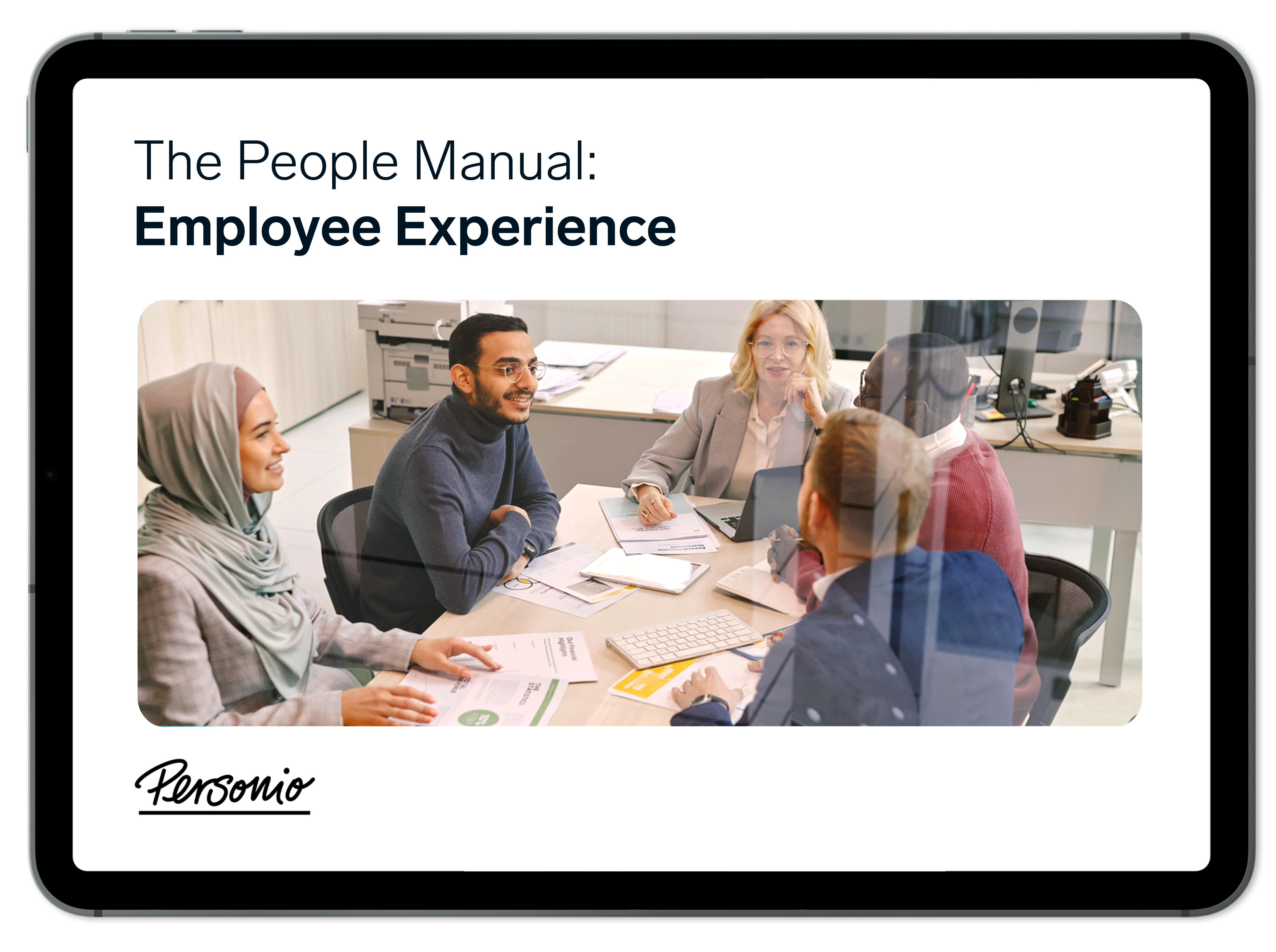Latest Blog Posts
10 People Management Skills That Lead To Organisational Success

Happy employees are more productive. And, productive companies are more successful. Yet, as many workplaces undergo rapid change and remote work becomes the norm, employee satisfaction levels are at risk of sinking.
When you have leaders with strong people management skills, they help keep this from happening and ensure the growth of the business. Here are the top 10 people management skills that really matter right now.
Ready to focus on every element of employee experience? Download our guide.Happy employees are more productive. And, productive companies are more successful. Yet, as many workplaces undergo rapid change and remote work becomes the norm, employee satisfaction levels are at risk of sinking.
When you have leaders with strong people management skills, they help keep this from happening and ensure the growth of the business. Here are the top 10 people management skills that really matter right now.
Interested in a practical introduction to corporate culture? Download our guide today.
Why Do People Management Skills Matter?
Anyone can spot a great manager: the one who seems to effortlessly attract attention and loyalty and just makes things move. Look deeper, though, and you'll find a strong set of interpersonal or soft skills that drive it all. Employee performance turns on these people management skills, and on a team leader’s ability to connect with and motivate team members (click here for our guide to motivating your employees).
What is people management, more generally? We put together a comprehensive guide to walk you through the entire concept. All you have to do is click here to read more about it.
It’s no wonder then that these skills are so sought after, especially in today’s changing work environments. In this article, we want to break down people management skills that you can use, starting today, to help build better processes and better relationships with your employees.
10 People Management Skills To Employ Today
So, that’s why we gathered a list of the 10 most important people management skills you should be developing or improving as an HR leader (or a leader, in general):
1. Operating with a Clear Vision
Managing with a clear vision may sound "pie in the sky,” but it’s actually a very important leadership quality. Clear vision means seeing the bigger picture and all the parts that exist within it. It operates on two levels:
On one, you are able to look at the current state of the organisation and see what’s possible now. On the other, you’re able to see beyond what’s possible today and view what is realistically achievable in the future. You can even envision a path to get there.
Setting a clear, consistent vision for what you expect of employees and of the organisation not only steers your strategic planning, it can also help you make difficult choices and quickly if need be (click here: how to set a path toward HR transformation for your business).
Your vision acts as a compass, and it is especially useful in a world of continued uncertainty like the one we find ourselves in right now.
2. Communicating Effectively
This appears high on the list of people management skills not just because it matters so much, but also because so many managers lack true mastery of it.
That’s hardly surprising because communication takes place in so many ways and each requires a different approach.
On any given day, for instance, you could find yourself:
Having a one-on-one with a stressed-out report
Delivering a presentation to a large group
Persuading your executive team to support a new project
Talking up your accomplishments with your boss
Leading a quarterly planning meeting with your team.
Communication sub-skills include listening, non-verbal communication, public speaking, writing, clarity, and persuasiveness.
If you’re like most people, though, you’ll be stronger in some of these communication areas than others. Yet it’s very worth investing time in making sure you are competent in all of them.
Good communication is often the difference between success and failure, and between a satisfied employee and one looking for a new role elsewhere (click here to read more about employee turnover and attrition rates).
Half a decade of insights on employee experience

Our "People Manual" covers all things related to employee experience and developing initiatives that result in more engaged employees. Grab your free copy right now.
Download It Today3. Trusting and Being Trustworthy
This is a powerful skill that can transform relationships and, in turn, organisations.
Especially true now that many teams are physically dispersed in home offices, the lack of face-to-face contact and uneven flow of information can leave some employees feeling uneasy. Strong bonds of trust work against this.
There are several aspects to trust, though, so let’s break them down…
First, managers need to be trustworthy. This kind of trust is earned, not given. You build it by being consistently honest (even when it’s uncomfortable), open to feedback, willing to follow through on commitments, owning up to mistakes, and avoiding bias (click here: more concrete ways to improve employee engagement at work).
Next, there is the trust that managers give their employees — trusting them to do the work, meet the milestones, and flag any questions or problems that require support. This is full empowerment, no micromanaging.
Finally, strong managers are also able to build trust within their teams. This requires transparency — making sure information can flow freely between people and teams in order to build cohesion and avoid misinformation.
4. Showcasing Empathy
This critical people management skill is getting a lot of attention in 2020, and for good reason. That’s because the Covid-19 pandemic has caused an unprecedented level of anxiety and insecurity at work.
In a U.S. study that took place this year, nearly 70% of employees surveyed said that the pandemic has been the most stressful time of their professional careers.
It’s hard to overestimate how important empathetic managers are to a business, particularly now, when workforces are scattered and plans can change quickly.
Empathetic leadership helps keep employee engagement and productivity high. Empathy is simply the ability to understand and share the feelings of another person. It is not about having answers to employee concerns.
Instead, it is about listening, allowing employees to feel heard, understanding their perspective, and creating a bond that allows you to work better with one another.
5. Connecting and Being Approachable
Building rapport with as many employees as possible is important but one of the more underutilised people management skills.
It’s about spending time listening to and engaging with employees at all levels and in different departments. Why? For one thing, it makes you more likeable, and likeable managers are more trusted and effective.
This may seem like common sense, but it’s also supported by research. Moreover, connecting with others gives you insights into what’s really going on at work: what the engagement level is, what employees are excited about, or what worries them.
Remote working arrangements may make connecting more challenging, but it’s not impossible. Consider doing 10-minute virtual coffee breaks with randomly selected team members a few times a week. Or, periodically ask to attend lower-level team meetings to listen and ask questions.
Be seen, be heard, and be open to sharing ideas.
6. Being Decisive
Management is about making decisions, so getting better at making and truly committing to your decisions is a must-have of almost all people management skills.
In times of change, team members look to managers for clarity. Being decisive will gain you the confidence and trust of employees, even if those decisions don’t always go well.
Managers who understand the process of good decision making are able to practice and master this skill.
So, start with these steps:
Keep your clear vision in mind at all times
Understand the cause of the fear you’re facing in making the decision and be open to change
Gather all the information you need
Look for the best one under the circumstances — and then decide. When it comes to people management skills, this one can make all the difference.
7. Ability to Motivate Your Employees
You may be motivated to show up to work every day, but there is a good chance that some of your employees are not as excited.
Even companies ranked highest for employee engagement achieve scores of around 83%. That’s certainly better than the average (between 59%-69%, depending on the study), but it still leaves nearly a fifth of the team feeling disengaged.
On top of this, data shows that remote workers are less motivated than those working onsite, making it even more difficult to fire up enthusiasm among your staff in the current “pandemic normal.”
Yet, engagement levels are strongly linked to company performance, and so your ability to motivate employees is as crucial as ever. So, how is this best done?
It really comes down to understanding what motivation is: the employee’s own drive to achieve something.
Your job, then, is to enable them to motivate themselves by finding out what they want to achieve. Is it recognition? More money? Greater responsibility?
As a people manager, you need to discover this for each team member and work with them to make it happen.
Dive Even Deeper Through Our People Strategy Guide

Gain insights directly from Personio's Chief People Officer on how to build a better people strategy roadmap today. Grab your copy, for free, right now.
Download For Free8. Accountability
Being able to take full-on responsibility for your decisions and actions, and those of your team goes a long way to helping build others’ trust in you.
Just as important, though, it encourages a climate of accountability on the whole team. Management accountability failures (e.g., blaming others for mistakes) can have a rapid snowball effect, sending engagement and morale spiralling downward.
So, whether it’s showing up for meetings on time, meeting project deadlines, giving timely feedback, owning mistakes, or communicating delays, you need to be a role model of accountability yourself.
As a people manager, you can insist on accountability from staff, too. Include it as one of the performance metrics in employee feedback talks.
9. Problem Solving
In business, everything is a problem that needs to be fixed. The better a company is at solving problems, the more successful it will be.
Effective problem-solving has perhaps never been more in focus than it is right now: with businesses changing working rules and shifting priorities quickly to cope.
It is necessary for company leaders, then, to focus on this as one of the most crucial people management skills at present. After all, you are ultimately accountable for the solutions your teams generate (see #8).
Effective problem-solvers are able to guide teams to reach their goals by spotting problems before they become unmanageable and by applying a systematic framework to solving them.
It starts by:
Identifying the problem
Defining and analysing it
Developing solutions
Planning and acting
Some people are naturally good at problem-solving, most are not. Building your problem-solving “muscle” is key. To be successful at it requires a combination of skills, including open-mindedness, analytical thinking, and creativity.
10. Enabling Professional Growth
Employees want to continually grow and learn in their jobs. It’s even a central part of engagement, studies show.
According to LinkedIn’s 2018 Workplace Learning Report, 94% of employees said they would stay at a company longer if it invested in their career development.
That’s why people management skills matter, and why this skill matters in particular: the extent to which you enable career growth for your team members will have a positive impact on retention and, therefore, your bottom line.
Your business may already have a development plan framework that employees can use. Or, you may be responsible for creating one yourself.
In any event, you will need to invest time in helping team members draw up a plan for where they see themselves next. Then you’ll work together to set quarterly goals, and define opportunities for training or other ways to develop skills.
It’s up to you to establish regular check-ins to monitor progress and give feedback. This is a time-consuming process, but no business can thrive without it.
Remember: People Management Skills Are Interconnected
The thing to remember is that these 10 people management skills are interconnected.
Empathy builds trust, and trust increases accountability, and so on. Managers need to focus on building all of these soft skills, not just a few. The success of your business, especially right now, depends on it.

